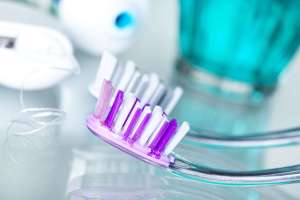How Oral Health Affects Overall Health

Do we know it?s important to take good care of your mouth, teeth, and gums for optimal oral health. Being diligent in brushing and flossing prevents bad breath, tooth decay, and gum disease? it can also ensure you keep your teeth as you age.
However, researchers are now finding all sorts of great additional reasons to brush and floss. A healthy mouth can help you prevent other medical issues. Contrarily, an unhealthy mouth, especially one with gum disease, can increase your risk of some major health concerns such as preterm labor, stroke, heart attack, and poorly controlled diabetes.
That’s why at Cooley DDS, we want you to understand just how important oral health is to your overall health.
Your Mouth Can Reveal a Lot About Your Health
So, what does your mouth have to do with your overall well-being? Surprisingly, a swab of saliva can tell your doctor a shocking amount about what is going on in your body.
Many Conditions Cause Oral Signs and Symptoms
While some say the eyes are the windows to the soul, the mouth is definitely a window into what?s going on inside your body. It offers a vantage point for spotting early signs and symptoms of systemic disease. Systemic disease is a disease that affects the entire body, not just one particular part. Several systemic diseases, like diabetes or AIDS, for example, show signs first with mouth lesions or other oral issues. According to the Academy of General Dentistry, more than 90% of all systemic diseases produce oral signs and symptoms.
Saliva: A Useful Diagnostic Tool
Your doctor can detect a variety of substances by merely collecting and testing your saliva. Specific cancer markers are apparent in saliva. It is also useful for monitoring bone loss due to the fragments of certain bone-specific proteins which can indicate a predisposition to osteoporosis. It’s even used to test for cortisol levels in newborn babies to test their stress response.
Saliva can also measure illegal drugs, hormones, and antibodies involving hepatitis or HIV infection, and environmental toxins. It actually has the unique ability to detect HIV-specific antibodies, which is why you know see over-the-counter HIV tests. In the future, saliva testing just might replace blood testing as a primary method of diagnosing and monitoring diseases like diabetes, Parkinson’s, cirrhosis of the liver, and other infectious diseases.
Super Saliva: Protector Against Bacteria and Viruses
Saliva also acts as one of your body’s primary defenses against bacteria and viruses which cause disease. It contains unique antibodies that attack nasty viral pathogens in everything from the common cold to HIV. It contains proteins, called statins, which prevents the growth of the Candida Albicans fungus. Whenever these proteins are weakened by illness or infection, the candida grows like crazy, resulting in oral thrush.

Dental Plaque: Dangerous Links to Infection and Disease
While your saliva does an excellent job protecting you against some invaders, it can?t get them all. You may not know this (or want to know this), but more than 500 species of bacteria live in your mouth at any given time. They are what make dental plaque? that sticky film that clings to your teeth and can cause health problems.
If you aren’t?t brushing and flossing as recommended, plaque can form along your gum line, creating a home for even more bacteria to live in the space between your gums and teeth. This infection is known as gingivitis. Left untreated, it can lead to periodontitis, a much more serious type of gum infection. After that, the most serious form of gum infection is acute necrotizing ulcerative gingivitis. You may know it as a trench mouth.
While bacteria from your mouth doesn?t typically enter your bloodstream, for those with gum disease regular brushing and flossing can open a port of entry for these microbes. Now, if you have a pretty healthy immune system, this oral bacterium won’t cause you any problems as your immune system will quickly get rid of them. However, for those with weakened immune systems, oral bacteria in the bloodstream (bacteremia) can lead to an infection in another part of the body. A very scary disease, infective endocarditis, where oral bacteria from the bloodstream stick to the lining of diseased heart valves, is just one example.
Is Plaque the Cause of Some Common Conditions?
Tooth loss is one of the unfortunate results of long-term gum infection. However, the consequences might be even direr. Research suggests there is a link between oral infections, primarily gum infections, and issues like cardiovascular disease, preterm birth, and poorly controlled diabetes. More research is needed to determine if oral infections actually cause these conditions conclusively.
Those who already have diabetes have an increased risk of developing gum disease. Infection may cause insulin resistance which really disrupts blood sugar control, making diabetes even harder to manage. ?
Gingivitis may have a role in clogged arteries and blood clots. The bacteria in the mouth, it seems, may cause inflammation throughout the entire body. The inflammation may be what helps create atherosclerotic plaque in the arteries, leading to a heart attack or stroke. Gum disease and tooth decay are also linked to plaque in the carotid artery as well.
The National Institute of Dental and Craniofacial Research approximates that as many as 18% of preterm, low birth weight babies born in the United States each year may be credited to oral infections. Oral bacteria releases toxins, which travel through the mother?s placenta to the fetus and can interfere with healthy growth and development. It can also produce labor-triggering substances too soon, potentially causing premature labor and birth.

A Convincing Case for Good Oral Health Habits
If a fresh, healthy, pearly-white smile wasn?t enough reason to take diligent care of your mouth, the connection between your oral health and total health gives you all the more reason to maintain a healthy oral routine. Commit yourself to practice good hygiene each and every day by remembering brushing and flossing is not only keeping your mouth, teeth, and gums healthy but your entire body healthy as well.
If you’re in the Memphis area and are looking for a dental practice to help you achieve better oral health overall, look no further than Cooley DDS. We can help you get back on track with your oral health by scheduling an appointment, and our friendly staff is able to answer any questions you may have about how to better take care of your teeth and gums. Make sure to stop by our Germantown location or give us a call at 901-754-3117.
